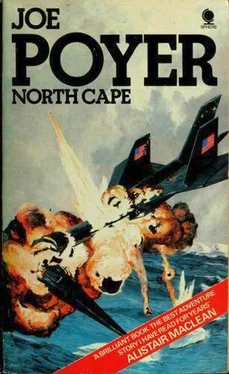He accepted the coffee that Larkin ordered and sat back in the chair to watch his commanding officer pouring his own coffee. Folsom really knew little about Larkin, and he doubted that many men did. Larkin was old Navy, relaxed but steeped in tradition; he probably would have been more at home in the more easygoing Australian or Canadian navies if he were to be judged by his command style. In two years he had yet to hear the captain raise his voice to give an order. And he could not ever remember Larkin having to give an order twice.
But the man kept his own counsel. Never had there been an exchange of personal information between them. What little he knew about Larkin had been gleaned from his service record, to which Folsom, as executive officer, had access, and from talk around the various officers’ clubs. The service record had been exceedingly dry, as always, but at the same time was an intriguing document, more from what it had implied rather than described. Folsom knew, for instance, that Larkin had commanded a destroyer during the Vietnam conflict and had been decorated with the Navy Cross for bravery under fire. But it had remained a noncommittal note in a record until he ran into a chance acquaintance in San Francisco who had been communications officer on the cruise for which Larkin earned the decoration.
The story was that Larkin had taken his destroyer to within a hundred yards of fringing reefs off the South Vietnamese coast just below the Demilitarized Zone. He was to lay down pointblank covering fire for a Korean patrol driven back and pinned down on the beach by a superior and well-dug-in North Vietnamese Army unit. Larkin had moved in so close that he had come under intensive mortar fire. The destroyer took three mortar rounds, one directly through the fan tail, which had exploded against the rudder controls, blasting them out of action. In spite of the damage, Larkin had remained on the scene, in fact moving in even closer to bring antiaircraft guns into broadside position to lay down a sweeping barrage for twenty minutes while army helicopters moved in to pull the Koreans out. The service record for some reason missed noting the award of the Republic of South Korea Distinguished Service Medal.
Folsom’s friend had many other tales of Larldn’s skill and bravery, which he was more than happy to relate to Folsom during a long two-fifths-of-gin afternoon and evening. All were in a similar vein. But what stuck most deeply in Folsom’s memory was his friend’s description of Larkin as an aloof, although quite personable, and lonely man. Exactly Folsom’s own conclusion.
Even Larkin’s face bore out his manner. It was a face that was at once alive but closed to outsiders. The gray eyes stared out at you from under straight, medium thin brows with a direct stare that forbade anything except the exact truth. Larkin was a tall man, but spare, almost to the point of gauntness in some respects. His face was thin, with the skin stretched tightly across the brow and nose. But the shoulders were broader than would have been expected for a man so tall and lean. There was something about the man, something in the posture, that Folsom could not isolate, that belied the personal aesthetism that really existed. The furniture in the cabin may have been comfortable and pleasantly arranged, but it was certainly not opulent. The color scheme matched the paneled and steel walls, but that was all. The desk, set under the air vent, was clean and neat. A choice selection of books could be seen in the barred rack over the desk and the titles were intriguing, indicating a disciplined mind.
Larkin settled into a chair facing him and balanced his coffee cup on the arm. He glanced at Folsom, who sipped at his coffee and waited. It was characteristic of Larkin, he thought, to unknowingly make you wait uncomfortably until he started to speak. The gray eyes peering out from the calm face gave the impression that Larkin was measuring your character and strength, It was not intentional, he knew. It was only that Larkin was marshaling his own thoughts.
Larkin cleared his throat “I noticed that you made a course correction. Good thinking. These seas are going to get rougher.”
Folsom nodded. “I had engineering rig up strain gauges on the bow patch. If it starts to weaken, we’ll want to know about it in plenty of time.” Larkin smiled briefly. “Yes we will at that.” He sat for a moment sipping his coffee. “I just got word from Virginia that our Russian friends are onto the system.” Folsom sat up. He really knew very little about the supersecret games they had been playing lately. Between themselves they always used the name Virginia to refer to the agency that directed their actions. Although he did not know really who “Virginia” was, he could pretty well guess that it meant the forty-two-acre complex in the hills just outside Washington that was Central Intelligence
Agency Headquarters. But what was the game the Russians were onto?
Larkin pulled a sealed envelope off the desk top and handed it to Folsom. “Open it.” Folsom tore the end off and extracted the folded papers. He spread them on his lap and picked up the top sheet. DOD 630-29K. That was one he had not seen before. He looked up questioningly at Larkin, but Larkin was gazing in deep absorption at the design on his coffee cup.
The top sheet was an instruction page for the five that followed. It held one small paragraph that immediately caught Folsom’s eye. If he accepted the terms of the attached contract and signed, he would be “liable to twenty years in a federal prison or $20,000 fine or both if he revealed to any unauthorized person or persons any material or information given to him in connection with that relayed to him by Captain Henly Larkin, USN, Commanding Officer of the battle cruiser U.S.S. Robert F. Kennedy , or in any way violated the provisions of the National Defense Act.” The rest of the forms were standard Department of Defense Top Secret Clearance sheets, already filled out and dated the day he had received his Top Secret clearance. Puzzled, Folsom turned the pages until he came to the last. It was a simple, green-colored sheet with a short list of questions and space for his signature and the date. It was headed “Q” Prime Clearance. He whistled softly. He had heard of the QPC, but never had expected to receive it. Usually, it was a clearance reserved for the President, cabinet officers, and the joint Chiefs of Staff, to whom there were no secrets. Not even the highest-ranking members of Congress got that one. He looked up.
“Rather surprising, isn’t it? But that’s how important this project is. Will you sign the form?”
Folsom nodded, and Larkin handed him a pen.
“Then do so,” he said quietly. Folsom scribbled his name and added the date.
“You are now cleared to receive ‘Q’ Prime information,” Larkin said. “The clearance search was run the day you came aboard, and if something had happened to me while we were on duty you would have found all of the instructions in my safe. The decision as to when to bring you into the project was left up to me. Because I believe that the fewer people who know about this project the safer it will be, I have not done so until now.” He paused to drink slowly.
“Why did you decide now that I should know about it?” Folsom asked much more calmly than he felt.
Larkin waved his hand in a manner to take in the ship and the storm raging outside. “To date there has been no emergency that has warranted it. But now there is what you might call a proper combination of circumstances. As I said, the Russians are onto our most closely guarded secret since the Manhattan Project. Additionally, the sea is running into one of the worst storms on record and our ship could be in very serious danger. In the next few hours you are going to have to have a full understanding as to why we are not going to be able to do anything more than complete our assigned mission at all costs. And, if we survive the storm, we may have trouble of a kind we have never encountered before except in practice” — Larkin hesitated, letting the tension build—“Soviet submarines may be out to sink us.” Folsom stared at him, wondering if the old man had not finally succumbed to the pressures of commanding a ship. As if aware of what he was thinking, Larkin grinned and shook his head. “No, I haven’t gone out of my mind.” He got up and pulled a map from the desk drawer and spread it on the table. It was a map of the northern Eastern hemisphere showing the Soviet Union, Europe, and the Arctic. On it was penciled in red a line paralleling the go° meridian to the Sinkiang border, then swinging north in a long, curving arc across the Soviet Union to their rendezvous position off the Ryabchi Peninsula of Scandinavia.
Читать дальше












